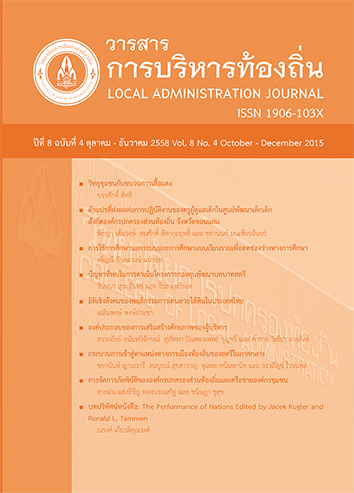วิทยุชุมชนกับขบวนการเสื้อแดง (Community Radio Stations and the Redshirt Movement)
Keywords:
วิทยุชุมชน, ขบวนการเสื้อแดง, Community Radios, the Redshirt MovementAbstract
รายงานวิจัยนี้มีวัตถุประสงค์เพื่อศึกษาพัฒนาการ บทบาท และการท้าทายการครอบงำประชาชนของรัฐ ข้อมูลที่ใช้ในการวิจัยได้มาจาก เอกสาร การสังเกตุแบบมีส่วนร่วมและการสัมภาษณ์ บทความนี้ได้ชี้ให้เห็นว่า วิทยุชุมชนเกิดขึ้นตามรัฐธรรมนูญปีพ.ศ. 2540 สถานีวิทยุชุมชนมีความแตกต่างไปจากสถานีวิทยุแนวเดิม กล่าวคือ ไม่ได้ทำหน้าที่เป็นกระบอกเสียงของรัฐ วิทยุชุมชนมีบทบาทอย่างสูงในทางการเมืองท้องถิ่น โดยได้ทำหน้าที่เป็นสื่อหรือช่องทางของการเคลื่อนไหว และระดมมวลชนของขบวนการเสื้อแดง ซึ่งสะท้อนให้เห็นถึงความสามารถทางด้านเทคโนโลยี การตื่นตัวทางการเมืองและการรับข้อมูลข่าวสารของชาวชนบท วิทยุชุมชนจึงเป็นสัญลักษณ์และมีบทบาทสำคัญในการท้าทายการผูกขาดช่องทางสื่อสารมวลชนของรัฐ วิทยุชุมชนได้ขจัดการปิดกั้นข้อมูลข่าวสารทางเดียว ในเชิงลักษณะการให้ข้อมูลชวนเชื่อของรัฐ ทำให้ประชาชนได้รับข้อมูลที่สะท้อนความเป็นจริงของสถานการณ์บ้านเมือง วิทยุชุมชนจึงเปรียบเสมือนเครื่องมือของผู้อ่อนแอที่ใช้ในการสร้างเครือข่ายเชื่อมโยง สร้างอัตลักษณ์ร่วม และเป็นศูนย์กลางในการท้าทายและขจัดการครอบงำประชาชนCommunity Radio Stations and the Redshirt Movement
The purpose of this paper is to study the development, roles and challenges that community radio stations pose for the Thai state. The data upon which this study was based were from documentary sources, observation, and interviews. All community radio stations in Thailand emerged only after the promulgation of the 1997 Constitution. Unlike the conventional radio stations, they do not function as a government mouthpiece. Rather, they were highly politicized and played a significant role in the local political landscape, and served as an intermediary center for mobilizing the redshirt movement. This reflects the fact that rural people who operated the radio stations were as technologically capable and politically astute as their counterparts in the urban areas. Consequently, community stations weakened the monopoly of the state controlled mass communication and emerged as a threat to the state. They also made it more difficult for the central government to propagandize and mislead people through their state-owned radio stations. The community stations provided the listeners with a different viewpoint about national affairs and socio-political development. Through their own networks, these stations functioned to fight suppression for those who were politically weak and, often, ignored by the state.
Downloads
Published
How to Cite
Issue
Section
License
The copyright of all articles published in the Local Administration Journalis owned by the College of Local Administration, Khon Kaen University.



